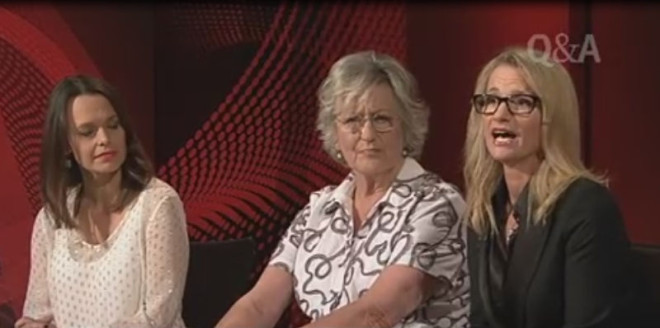Feminism, Thatcher And The Unexpected Tameness Of Last Night’s Q&A
It was all smiles and politeness on the lady-only panel last night, in spite of Mia Freedman and Janet Albrechtsen rubbing shoulders with Germaine Greer. So - what happened?

It was the moment that nobody participating in last night’s #ladyqanda drinking games could have adequately prepared for.
The evening’s activities had begun disappointingly, with Tony Jones sitting in his usual chair despite possessing the wrong set of genitals. Unfathomably, he also thought it was a good idea to open proceedings by asking his esteemed female panelists — Germaine Greer, Janet Albrechtsen, Mia Freedman, Brooke Magnanti and Deborah Cheetham — to discuss whether or not they’re capable of opening doors for themselves.
Chivalry? Seriously? There wasn’t a single question in Q&A’s inbox that seemed a higher priority? Anyone who laments the loss of chivalry needs to stop flogging Lancelot’s horse, because it’s good and dead and we don’t need a panel of serious feminist thinkers to tell us why. Just like we don’t need you to hold doors open for us, because we have arms and legs. If we don’t have arms or legs, or we are 100% definitely heavily pregnant (please don’t get this wrong), or if we are 100 years old, feel free to show off your gender-neutral manners and maybe we’ll do the same for you. But don’t do it because we have boobs and vaginas or because we’re wearing a dress or heels or lipstick or carrying a handbag, and please don’t ever make us explain the difference between chivalry (sexist) and general courtesy (not sexist) again. Ugh!
From opening doors and paying for dinner, to a scene I don’t remember in the latest James Bond film where he apparently keeps some woman waiting in the shower, to the snug fit of Bond’s suits (?), a total of six minutes was devoted to this first world not-even-real-problem. Unfortunately for those of us who like to see some heat generated under collars, a general mood of politeness caused a disappointing lack of claws-out for the rest of the program. An eloquent Mia Freedman even made up with Germaine Greer after her widely-read smackdown on Greer’s last Q&A appearance, and Janet Albrechtsen almost came across as a reasonable person. Deborah Cheetham was so polite she barely got a word in, and the science genius and former sex worker who wrote her memoirs into Diary of a London Call Girl, Dr Brooke Magnanti, became everyone’s new hero by being generally erudite and also telling Tony Jones off for using the word “prostitute” to describe women of her former profession. It was as close as we’d get to a bitch slapping all night.

Crazy lady says crazy lady things. Germaine concentrates on biting her tongue for the first time ever. Mia sleeps on.
In a brilliant piece of murder accidental foreshadowing, Magnanti answered a tired Gillard-bashing questioner by referring to the disappointment many British feminists would have felt about their country’s first female PM. Ten minutes later, Jones broke the news that Thatcher was dead, and everyone at home sculled their drinks.
Which brings us to the question of the night: was Margaret Thatcher a feminist, a feminist icon, or in any way, shape or form a thing that feminists should admire? There’s no doubt the Iron Lady was a formidable force in British politics, a bright blue beacon in a room full of grey suits. She was a pioneer because she was the first woman to do the job, and there’s nothing wrong with feeling some admiration for her balls of steel.
But the question of whether Thatcher was a feminist, or whether feminists should admire her work, is kind of misguided. She probably wasn’t, and they probably shouldn’t. But Thatcher is nevertheless important to feminism, because she proved something important about what women can be — and I don’t just mean that we can be Prime Ministers. Women can be things that we don’t admire — we can be obstinate, narcissistic, self-interested, harsh, tyrannical, even evil – and that’s okay for feminism. We are not necessarily nurturing, kind people who stick together no matter what, and shout about women’s rights from the sidelines. We don’t always do the right thing. We don’t all want the same things. We can be mothers and we can be warmongers. We are good people and we are bad people, we triumph and we fall, just like men.
I won’t drink to Thatcher, but I’ll drink to that.
–
Jenny Noyes writes from Sydney’s inner west. She enjoys music and feminism and other types of arts and politics, and making opinions about those subjects which may or may not be well-informed. You can read some of her music-related opinions in The Brag, and send her compliments @jennynoise.